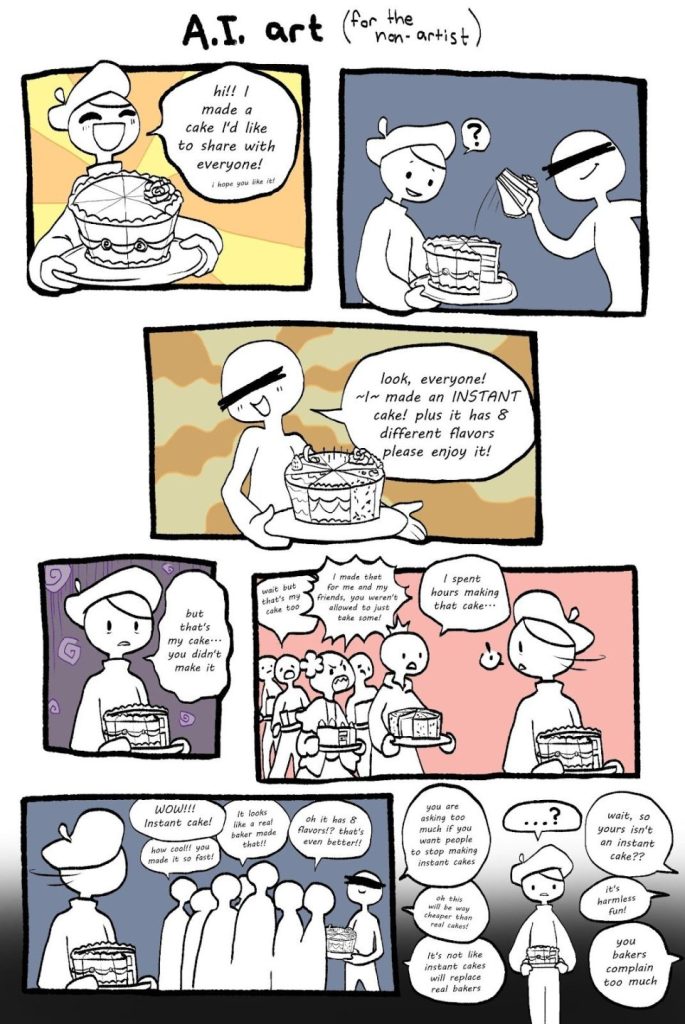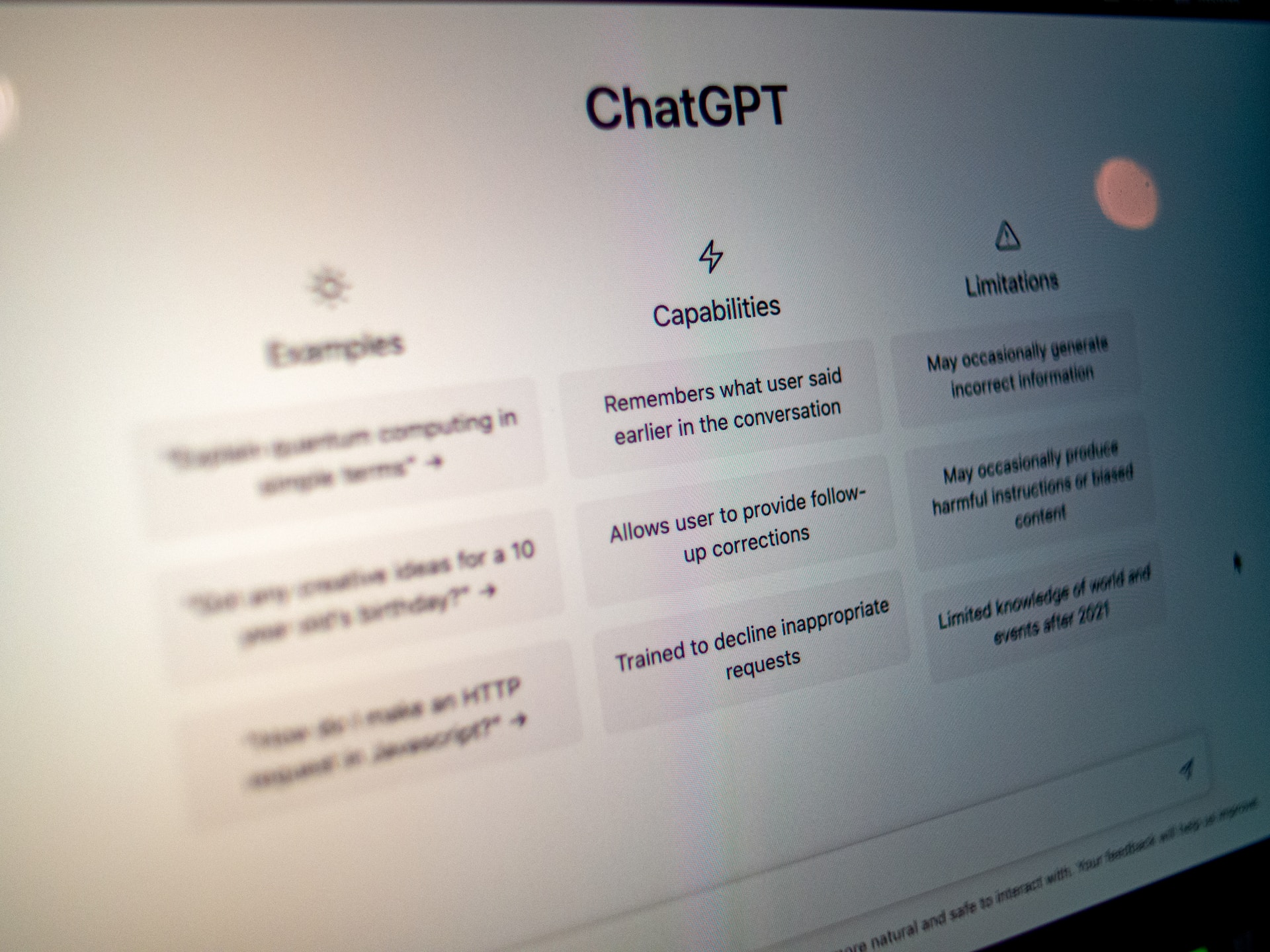As we write this, the Screenwriter’s Guild of America is on strike. The writers of all your favourite shows have downed pencils and taken up placards, refusing to write another word until studios and networks heed their demands.
They want several things, not least of which is fair recognition and pay for their hard work. But one of their proposals goes like this:
“Regulate use of artificial intelligence on MBA-covered projects: AI can’t write or rewrite literary material; can’t be used as source material; and MBA-covered material can’t be used to train AI”
Basically, the writers don’t want their jobs and recognition for their work going to AI. They want protections against AI-generated writing being used in screenplays and storyboards by the big networks and studios.
This AI proposal has, thus far, been refused, indicating that studios do intend to produce AI-influenced work (or at least would like to retain the option to) at some point in the future.
What has all this got to do with Sox? Well, it’s not just Hollywood screenwriters who are affected by the rise of creative writing AIs. The screenwriter strike and its AI proposals neatly encapsulates a far wider movement, encompassing pretty much every kind of writing you can think of.
As a brand on the internet, you are likely to use a huge amount of writing. Your web pages, your adverts, your marketing emails, your blog posts, your social media – all of these require good writing in order to be effective.
That’s why we asked our copywriter to take a look at the prickly AI arts and writing debate, and give us her thoughts.
The issue in a nutshell
The AI and creativity issue is a thorny one, with a lot of layers and a lot of forcible opinion on both sides. Quite honestly, I could write an entire series on this debate – but I don’t think Sox want an entire series on the economics and philosophies of creativity clogging up their blog. So I’ll try and condense the major points of debate into four main areas:
- Jobs. A lot of writers are concerned that AIs like ChatGPT could be used to replace them, leaving an already marginalised and underfunded group in dire straits.
- Quality. As AI feels no emotional connection to what it ‘writes’, and cannot have a nuanced and human understanding of its subject matter, can it really produce high-quality work?
- Plagiarism. AI ‘trains’ itself on extant work, so anything it writes will essentially be recycled versions of other writers’ work. Is this plagiarism, or is it acceptable?
- Bias. AI tends to follow the majority consensus in any given piece. If trained on dubious parts of the internet, this could lead to some very questionable biases in its pieces.
Let’s delve a little deeper into each of these.
AI and writers’ jobs
There are plenty of arguments pro and anti AI doing ‘human work’. The pro-AI argument usually focuses on the fact that AIs and automations can make human lives a lot easier. By taking on mundane, difficult, repetitive tasks, they free up humans to work on more fulfilling tasks.
I can’t say that I haven’t benefited from automations and machinery. Without my washing machine and vacuum cleaner, for example, I would spend half my life doing laundry and cleaning.
I’m even open to the idea of AI writing some copy. For example,I find writing product descriptions deadly dull, and some SEO writing projects make me want to bash my head against the wall. So I’d be more than happy for ChatGPT to take over that kind of thing…
…with one CRUCIAL caveat.
Pay.
It’s no good stating that AI writers will allow human writers to work on more enjoyable, fulfilling projects if those writers can’t afford their rent. Without ‘dull’ projects to pay my bills when I was starting out, I’d never have become a writer in the first place. I’d be too busy working whatever minimum-wage jobs I could to survive.
I and many other freelancers periodically rely on ‘dull’ projects to tide us over when more exciting projects aren’t available. Not to mention that most young copywriters cut their teeth on things like product descriptions and SEO. Without that work, they would have no ‘in’ to the industry. They would never get the chance to build up a name for themselves, and would never learn crucial skills like client-handling and the discipline that freelance writing of any kind requires.
Further, if AI is being considered for high-tier writing work like screenwriting, what ‘more fulfilling’ projects are left for writers to move on to?
At the end of the day, we can’t just say ‘Hooray! Now that AI is writing all the boring copy, we can concentrate on writing our dream novels!’. It doesn’t work like that. If we’re not getting the ‘boring’ work and – more to the point – getting paid for it, there’s no way we can afford to sit around writing ‘fulfilling’ novels on the (very slim, by the way) chance that our novels will be published or the (even slimmer) chance that we will be able to earn a living from them.
Whatever work the AI is doing, if it takes away a paid job from a human writer – and that paid job is not replaced by another job in the same industry – I’m not a fan.
The quality of AI writing
I’m going to lay my cards on the table from the get-go here: I find this argument pretty snobby.
Writers can be notoriously snobby about what constitutes ‘quality’ writing. Personally, I prefer to leave that judgment to the intended audience. For example, I don’t think that the jokes about poopoo and peepee in my godson’s favourite Youtube Kids channel are that funny. But I’m not the intended audience. They work incredibly well for my godson. He screams with laughter at every fart noise. And it’s his opinion that really matters here.
Many writers say that AIs like ChatGPT cannot, by definition, produce ‘quality’ work as an AI cannot connect to its work or its audience in the same way that a human writer can. I have a degree of sympathy for this. I think it’s a shame that art intended to emote will be produced by machines that can never feel the emotions they’re ‘aiming’ to evoke.
But, if it works for the audience, whether or not I think it’s ‘a shame’ is a moot point.
Consistency is more of a concern for me. I’ve seen some surprisingly good stuff produced by ChatGPT. I’ve also seen some incoherent rubbish. While AI ‘writers’ will doubtless improve rapidly, I would certainly never use an AI for anything I’ve been commissioned to write. I simply could not trust it to consistently produce reasonable writing.
Nor could I rely on its judgement when writing for a niche audience. AIs are trained on a broad range of texts, which means that they are inveterate generalists. As they lack human judgement, I would not trust them to create more niche, sensitive writing for a less general audience.
Which brings me, in a roundabout sort of way, to the next point: plagiarism.
Is AI writing plagiarism?

This is a really thorny subject. As AI writing is based on the writing of hundreds of thousands of other writers throughout the internet, is it effectively plagiarising?
There’s an old saying: ‘Copying from one source is plagiarism. Copying from lots of sources is research’.
All writers borrow from one another. From the time we first learn to read we are absorbing other styles, turns of phrase, topics, tricks of the trade, and more. And it goes further than mere osmosis. When I am asked to write an article on a certain topic, the first thing I do is go to Google and read through as many existing articles on the topic that I can find.
So far, this is more or less what AI does when asked to write on a topic – only AIs like ChatGPT do it a lot faster. So is it fair to accuse writing AIs of plagiarism when all human writers do more or less the same thing?
It’s a tricky moral conundrum. Let me put it in the form of an analogy:
Let’s say someone takes a photo of a flower. They then send that photo to two artists, and requests that they draw it.
One artist traces the flower, creating a more or less exact replica of the photo with little to no artistic skill. The other artist paints the flower freehand.
Neither artist has gone out and painted the flower from life. And both have produced a decent representation of the flower. But which is the more ‘honest’ drawing? Which has the most artistic quality? Which artist has behaved more honourably? Which is the best drawing?
That’s up to you to decide. And it’s much the same with AI. Many writers feel that it is morally repugnant to use AIs to ‘trace’ the work of previous writers for new content – but the debate has more nuance than many would have you believe.
Are AIs biased?
I alluded to this issue earlier, when I said I would not trust an AI to make the right judgements when writing for a niche audience. AIs like ChatGPT are generalists, and they follow the general moods and phraseology of the internet.
If you’ve spent any time at all on the internet over the last two decades, this should give you some concerns.
Several early experiments with chatbots had to be swiftly scrapped, as the AIs became incredibly racist and misogynistic in a matter of hours. There is a HUGE amount of hate out there on the internet, and AIs are easily influenced.
We have admittedly come a long way in recent years. AIs are moderated and programmed to avoid discriminatory language. The problem is that the internet is still incredibly biased. We as humans have to make conscious decisions every day to avoid our biases, and even then we often fail.
AIs don’t have that capability so, as a result, they tend to go with majority views and representations. This means that minority groups often miss out when AI is in charge. For example, to this day facial recognition AIs struggle to identify darker-skinned faces.
I worry that AI writers will work with the ‘assumption’ that their audience is entirely comprised of white, straight males. I fear that AI writers will overlook the experiences of women and LGBTQIA+ individuals. Even humans struggle to properly represent women, LGBTQIA+ people, and people of colour. What chance do AIs have?
No doubt AIs can be programmed to be more inclusive. But will they be? Bias in AI development is a hot topic at the moment, and it’s one that will have huge influence over the future of AI writing.
For more on AI writing, and our own writer’s perspective on the topic, stay tuned!
This is the first part of a two-parter, so we’ll be visiting this subject again in our next blog post in mid-June.

